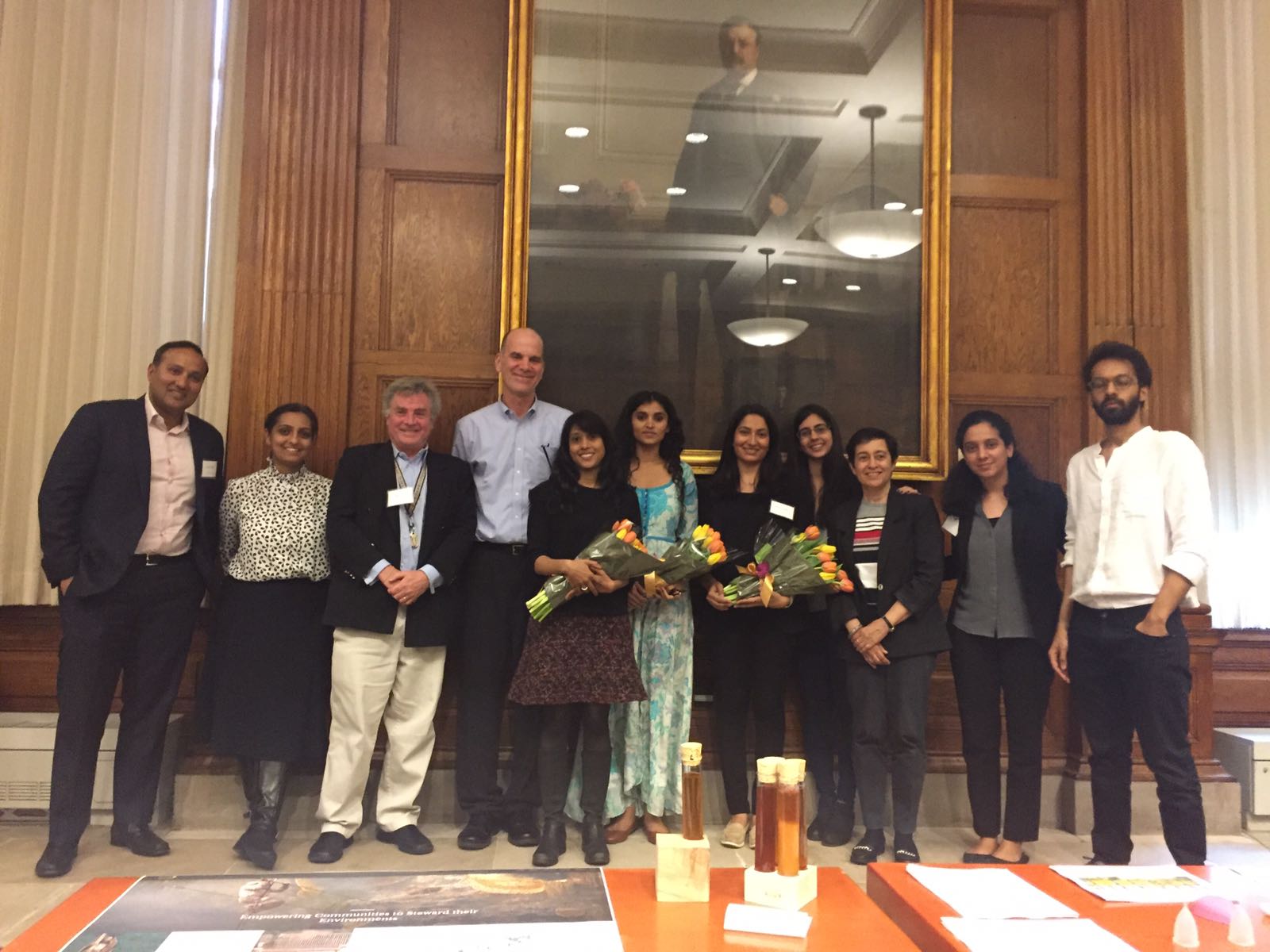 Congratulations to Sakhi, the winners of our 2017 Seed For Change competition. The team won $40,000 to further develop menstrual cups that are high-quality, affordable, and environmentally safe in India.
Congratulations to Sakhi, the winners of our 2017 Seed For Change competition. The team won $40,000 to further develop menstrual cups that are high-quality, affordable, and environmentally safe in India.
The two other finalists were:
Anantara, which converts collector-only economies into craftsmen communities whose culturally rich, value-added activities positively reinforce forest ecosystems.
Barakat Bundle, which reduces preventable infant and maternal mortalities and morbidities in South Asia by packaging together demand-inducing newborn essentials such as baby clothes and baby powder as well as low-cost evidence-based public health items such as clean delivery kits for safe births and oral rehydration salts for diarrhea.
More information about the presentations from our annual symposium:
Sakhi is a social enterprise that provides an innovative, high-quality, low-cost, reusable, and environmentally-safe menstrual cup for women and girls in India, along with a gender and culture-sensitive menstrual health education and training program. Sakhi’s 360-degree approach addresses the significant challenges and taboos faced by the world’s largest menstruating youth population—116 million girls ages 15-24—and the world’s second largest menstruating female population—358 million women between ages 15-54. Sakhi’s team and strategy prioritizes local entrepreneurship and self-sustainability; culture, religion, and gender sensitivity to create positive social norms; and attention to health safety, sanitary practices, infrastructure challenges, and environmental sustainability. Sakhi’s unique medical-silicone sterilizer case with menstrual cup is a one-of-a-kind solution, custom-designed for Sakhi’s demographic that includes married millennials, young mothers, working women, and athletes. Seed for Change’s one-time investment and Sakhi’s community reinvestment strategy will yield project sustainability over the first three years and profitability in subsequent years. Seed for Change’s valuable support will enable Sakhi to incubate the social enterprise to help Indian girls and women eager for an affordable, portable, safe, and hygienic market-based solution to manage their monthly menstruation cycle with dignity, safety, and confidence.
Team Members: Sutopa Dasgupta, Ph.D. student, Harvard University; Andrew Powell; and Usha Venkatachallam
Anantara is a not-for-profit design collective working at the intersection of forest conservation through livelihood creation. By working with forest communities and their emerging small forest enterprises, they seek to convert collector economies into craftsmen communities through design. The focus is on sustainable harvesting and the creation of new value chains and value-added facilities within forest communities, to provide year-round employment opportunity through environmentally reinforcing activities. Forest degradation is linked to unsustainable harvesting, which is a result of acute poverty. Such practices threaten to erode indigenous cultural knowledge that has accrued over centuries as the forest communities stewarded their ecosystems. There are several NGOs and support institutions actively working to address the issues of forest conservation through sustainable harvesting and livelihood creation, but they have been largely unsuccessful across two major verticals: design development and market linkages. Anantara seeks to bridge this gap by providing branding, product design services, and a marketing platform. They will create value for the support institutions by increasing efficacy of their livelihoods program, and create value for the small forest enterprise by improving their products and providing a market for the same; thus, empowering forest communities to better steward their ecosystems.
Team Members: Aaron Mendonca, Harvard Graduate School of Design; Prathima Muniyappa, Harvard Graduate School of Design; Prabhat Kumar; and Elena Mechik
Barakat Bundle is a nonprofit providing lifesaving bundles to mothers and newborns in South Asia. They package together demand-inducing newborn essentials—such as baby clothes—as well as low-cost, evidence-based public health items—such as clean delivery kits for safe births. They provide them to low-income mothers for the birth of their first child. The medical items in the bundle specifically target causes of maternal and infant mortality and morbidities in targeted regions. The desirable goods incentivize demand for the bundle, encouraging utilization, and some also address cognitive development. Barakat Bundle integrates seamlessly into existing community health worker and health system infrastructure creating a framework for sustainable delivery. For more information, visit barakatbundle.org.
Team Members: Karima Ladhani, Harvard School of Public Health; Nayab Ahmad, Harvard College ’15; Dr. Jyoti Ramakrishna, Harvard School of Public Health; and Amanda Hahnel
